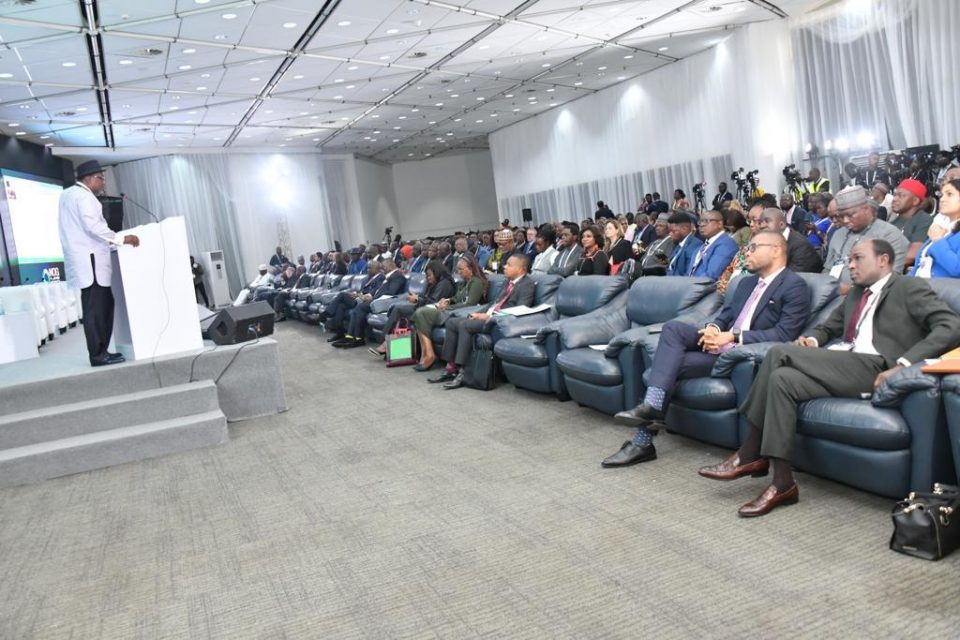Photo caption:
Executive Secretary, Nigerian Content Development and Monitoring Board (NCDMB), Engr. Simbi Kesiye Wabote delivering the opening address at the 2023 Nigerian Content Seminar at the Nigerian Oil And Gas Energy Week (NOG 2023) in Abuja on Monday.
*Affirms Board’s mandate to support local companies
By Emeka Ugwuanyi
The Nigerian Content Development and Monitoring Board (NCDMB) and the Nigeria LNG Limited are collaborating to roll out tender opportunities from the gas production and processing company on the Oil and Gas E-Market Place, thereby implementing a key provision of the Nigerian Oil and Gas Industry Content Development (NOGICD) Act.
Section 106 of the NOGICD Act defines the “Oil and Gas E-Market Place” as a virtual platform for buyers and sellers of goods and services in the oil and gas industry that allows for speedy and transparent transactions.” This provision of the Act had not been implemented since the enactment of the Act in 2010.
Speaking on Monday at the Nigerian Content Seminar at the Nigerian Oil and Gas Energy Week (NOG 2023) ongoing in Abuja, the Executive Secretary NCDMB, Engr. Simbi Kesiye Wabote, revealed that the roll out of the Oil and Gas E-Market Place project would be carried out in phases and is starting with the Nigerian LNG Limited. He said that a joint working committee comprising members of the company and the Board was formed to co-create the Blueprint for the Phase-1 implementation of the E-Marketplace, while subsequent phases of the project will include members of the Oil Producers Trade Section (OPTS), Independent Petroleum Producers Group (IPPG), and the other stakeholder groups.
He commended the Management and Staff of Nigeria LNG Ltd for being ever ready to comply with the provisions of the NOGICD Act and for demonstrating genuine willingness to partner with the Board in various initiatives, recalling that the Service Level Agreements (SLA) was initiated with the company in 2017, to drive the timely approvals of requests submitted to the Board.
The Executive Secretary explained that the Board uses the Nigerian Content Seminar to discuss the various elements of the NOGICD Act with industry operators, service providers and other stakeholders in the industry, noting that this year’s seminar provided a platform to clarify the provisions of the NOGICD Act (2010), the Ministerial Regulations, guidelines, tools and initiatives.
Speaking on various segments of the NOGICD Act, Wabote quoted section 70 (h) to justify the Board’s assistance of local contractors and support of Nigerian companies to develop their capabilities and capacities in furtherance of Nigerian Content development in the Oil and Gas industry. This clarity is meant to correct the wrong perception held in some quarters that the Board is acting outside its mandate by supporting and partnering companies in strategic business ventures.
Wabote emphasized that this provision is “at the heart of developing local capacities and capabilities in the oil and gas industry. According to him, this provision explains why the Board embarked on several initiatives including the funding support and other initiatives that are directed toward developing both human capital and infrastructure. He listed some of the initiatives to include the $300million Nigerian Content Intervention Fund with the Bank of Industry (BoI), the $100million Matched Fund with NEXIM Bank, the $50million R&D Intervention Fund and the $50million NOGAPS Manufacturing Fund.
Other support provided by the Board to local companies include partnering with local businesses to establish modular refineries, gas processing plants, LPG storage facilities, Base Oil production plant, LPG depot and refilling plants, and others with clear exit plans once the target goals are achieved.
The NCDMB boss observed that there are severe challenges negating manufacturing in the oil and gas industry, which is why the Board is developing the NOGAPS Industrial Parks to provide modern infrastructure using the “sites and services” model to support in-country manufacturing.
He reported that the Industrial Parks are at various stages of development in seven states namely Akwa Ibom, Bayelsa, Cross River, Delta, Edo, Imo, and Ondo states, hinting that “the NOGAPS Industrial Parks at Odukpani in Cross River state and the one at Emeyal-1 in Bayelsa state are both at advanced stages of completion and will commence operations in 2024.“
While appreciating the contribution of the Shell Petroleum Development Company Joint Venture and the ExxonMobil Joint Venture for their contributions to the industrial parks using the CDI programmes, he confirmed that the Board has commenced the allocation of manufacturing shopfloors and services plots at the Odukpani and Emeyal-1 parks to qualified applicants.
Speaking at the panel session titled “Exploring Emerging Opportunities for Local Content in Achieving Energy Security,” the Director Planning Research and Statistics, NCDMB, Mr. Abdulmalik Halilu emphasized the need to focus on manufacturing as a veritable strategy for promoting local content in the oil and gas industry. The reason is because manufacturing accounts for 54 percent of the spend on major oil and gas projects. He hinted that the Board’s programmes for supporting manufacturing included developmental and monitoring interventions. The developmental interventions include the Nigerian Content Manufacturing Initiative (NCMI) which is the precursor of the Nigerian Content Equipment Certification (NCEC). Those programmes are geared to compel original equipment manufacturers to rethink their business models and to begin the manufacture some components of their equipment in Nigeria. Other initiatives include the Nigerian Oil and Gas Parks Scheme (NOGaPS), which is designed to enhance efficiency of manufacturing and cut off entry barriers.
Also speaking, the Director, Capacity Building, NCDMB, Dr Ama Ikuru canvassed that the Federal Government should address the challenges that militate against manufacturing in the oil and gas industry. Some of the initiatives included providing dedicated power and fixing roads that lead to manufacturing facilities.




